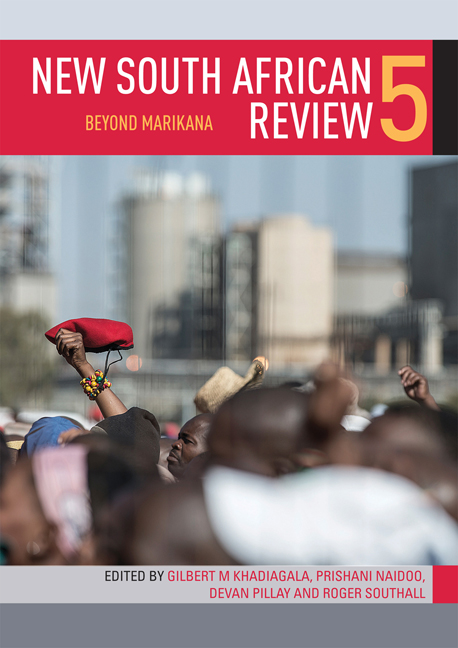Book contents
- Frontmatter
- Contents
- Preface
- Introduction: Political reconfigurations in the wake of Marikana
- PART 1 NEW POLITICAL DIRECTIONS?
- PART 2 ECONOMY, ECOLOGY AND LABOUR
- Introduction to Part 2
- Chapter 4 The South African economy: The minerals-energy-finance complex redubbed?
- Chapter 5 Between a rock and a hard place: State-business relations in the mining sector
- Chapter 6 The platinum belt strike wave: Breakdown in the institutionalisation of industrial conflict
- Chapter 7 When gold mining ends: An environmental catastrophe for Johannesburg?
- PART 3 STATE AND SOCIETY
- PART 4 SOUTH AFRICA IN THE INTERNATIONAL ARENA
- Contributors
- Index
Chapter 4 - The South African economy: The minerals-energy-finance complex redubbed?
from PART 2 - ECONOMY, ECOLOGY AND LABOUR
Published online by Cambridge University Press: 21 April 2018
- Frontmatter
- Contents
- Preface
- Introduction: Political reconfigurations in the wake of Marikana
- PART 1 NEW POLITICAL DIRECTIONS?
- PART 2 ECONOMY, ECOLOGY AND LABOUR
- Introduction to Part 2
- Chapter 4 The South African economy: The minerals-energy-finance complex redubbed?
- Chapter 5 Between a rock and a hard place: State-business relations in the mining sector
- Chapter 6 The platinum belt strike wave: Breakdown in the institutionalisation of industrial conflict
- Chapter 7 When gold mining ends: An environmental catastrophe for Johannesburg?
- PART 3 STATE AND SOCIETY
- PART 4 SOUTH AFRICA IN THE INTERNATIONAL ARENA
- Contributors
- Index
Summary
INTRODUCTION
Change in South Africa has been described by a variety of adjectives: ‘suspended’ (Habib 2013); ‘lost’ (Terreblanche 2012); or ‘precarious’ (Barchiesi 2011). Many of the assessments of twenty years of democracy convey a sense of paralysis. The shifts in policy from one acronym to another – RDP, Gear, AsGISA, NGP and NDP – and the way the changes seem to make little difference to outcomes, reinforces this feeling of stasis. If there has been ‘give’ it might be said to come from the repeated talk of crisis in the business press with its ‘fear’ of more industrial unrest; the ‘uncertainty’ in the mining sector; weakening economic growth and downgrades by ratings agencies; and the ongoing power supply crisis. Back in 2013, for example, the Financial Times characterised South Africa's ‘faded rainbow’ as marked by a ‘prolonged bout of industrial and social unrest … against a backdrop of creeping disaffection with government, internal dissent within the [African National Congress] and faltering confidence among investors’ (Wallis and England 2013).
The story has been repeated many times. This chapter addresses the question of crisis, continuity and change since the defeat of apartheid by focusing specifically on South Africa's political economy and emphasising the continuing economic dominance of both mining and finance in shaping contemporary dynamics: the argument is that many features of the apartheid past do not simply remain as residuals untackled by state policy but are actively being reproduced in the post-apartheid context, albeit in changing ways. The chapter uses particular key dynamics to demonstrate some of the most salient features of the economy.
The first of these is the ongoing scale and economic importance of South Africa's mineral wealth, which remains immense – a Citigroup report in April 2010, for example, identified South Africa as the world's richest country in terms of its mineral reserves, valued at US$2,500 billion. Platinum group metals (PGMs) constitute the bulk of this value, some US$2,300 billion, all of which is located in the Bushveld Igneous Complex (BIC), a geological formation spreading across Gauteng, North West and Limpopo provinces. This area also contains the world's largest chromium and vanadium reserves and produces ferrochrome, nickel and other minerals.
- Type
- Chapter
- Information
- New South African Review 5Beyond Marikana, pp. 67 - 85Publisher: Wits University PressPrint publication year: 2015



